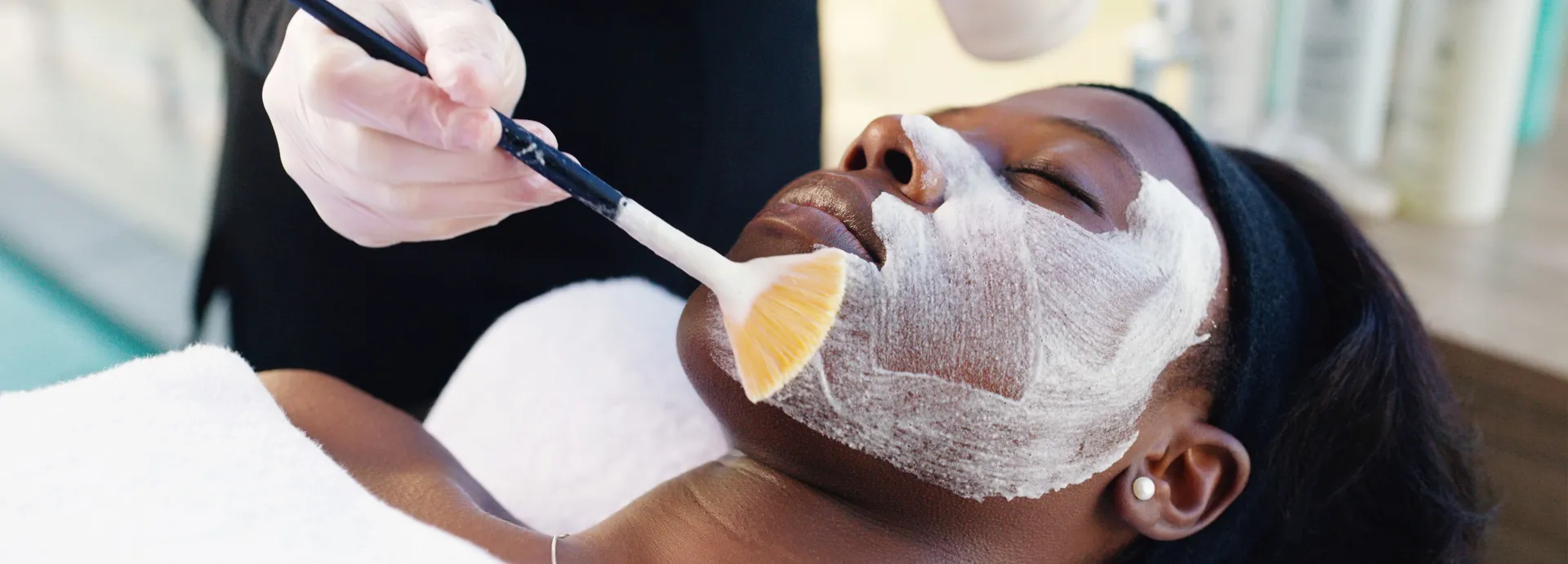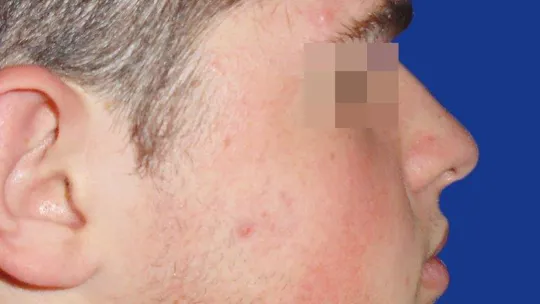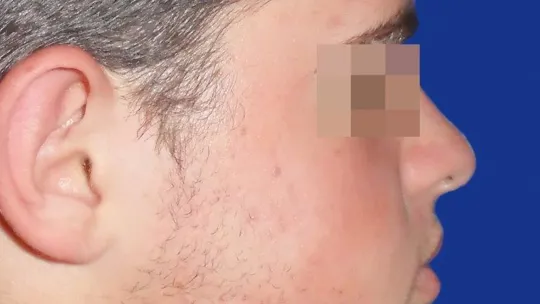
Chemical Peels
Want to rejuvenate your skin through one of the best age management, exfoliating techniques?
With chemical peels, a chemical solution containing active ingredients is applied to the skin that causes it to exfoliate, revealing new, regenerated skin.
University College Birmingham uses both Mesoestetic and Neostrata chemical peels, award-winning brands to create an individual treatment plan specifically for the clients concerns. The peel used are available in different strengths – highly superficial and superficial – depending on the level of exfoliation you require. However, we will always start you on the highly superficial peel and build up from there.
Our chemical peels contain clinically proven ingredients to help improve specific skin conditions and visible signs of ageing.
Single acid peels
Mandelic 30% / 40% – superficial peel with no downtime
A gentle peel that is a great choice for a first-time chemical peel. Unifies pore size, reduces sebum production and improves the overall texture and tone of the skin. For sensitive, ageing, quick-reacting skin, rosacea and oily skin.
Lactic 30% / 40% – superficial peel with no downtime
The lactic acid peel helps to hydrate the skin, promoting softer, smoother skin, as well as improving ageing skin and hyperpigmentation. For dry, dehydrated skin, uneven skin tone, ageing, dull and sensitive skin.
Citric 30%
Neostrata ProSystem Brightening Peel contains 30% citric acid and can be used for patients whose concern is uneven pigmentation to create a more even skin tone. This acid can be used in combination with glycolic acid to further boost results.
Glycolic 20% / 35% / 50% – superficial/medium peel with no downtime, but some tingling and erythema
This repairs and regenerates skin and is a versatile and fast-acting acid exfoliant which effectively helps oily and problematic skin, while improving the appearance of fine lines, uneven skin tone and texture. For oily, problematic skin, ageing and sun damaged skin.
Salicylic 10% / 20% – superficial/medium strength peel with some peeling
This peel deeply cleanses pores with its antiseptic properties. Treats oily, congested and acne-prone skin and helps regulate oil control, smoothing and balancing the complexion. For oily and acne-prone skin.
Combined acid peels
Melanostop – superficial/medium strength peel with some peeling
This peel has a depigmenting effect on the skin, helping to correct sun-damaged skin and age spots which cause uneven discolouration on the face and make the skin look uneven in colour. For hyperpigmentation and sun damage. Contains 20% Azelaic, 10% Resorcinol and 6% Phytic acid.
Azelan – superficial/medium strength peel with some peeling
This peel has antibacterial, anti-inflammatory and oil regulating action to calm inflamed and acne-prone skin, while unclogging pores and removing dead skin cells. For all manifestations of acne. Contains 20% Azelaic and 20% Salicylic acid.
Modified Jessner – superficial/medium peel with mild peeling and erythema
This synergy of effective acids is designed to have a transformative effect, reducing the appearance of melasma, freckles and acne. This versatile treatment creates dramatic change in the skin. For hyperpigmentation and anti-ageing. Contains 14% Lactic Acid, 14% Salicylic Acid, 14% Resorcinol, Resveratrol, Raspberry Fruit Extract and Lycopene.
TCA – medium/aggressive peel with downtime and peeling
This peel improves the appearance of ageing skin, smooths fine lines and enhances skin tone. Contains 15% Trichloroacetic Acid, Vit-a-like, Yogurt Extract, Phytic acid, Kleptose.
Clarifying - 10% citric acid and 20% mandelic acid
Clarifying can be used for patients whose primary concern is oily or acne-prone skin, this can also include superficial acne scarring or spots. This Neostrata peel can be used in combination with glycolic acid to boost treatment results.

BEFORE

AFTER

Course of six treatments every 2-4 weeks

£50 per treatment or course of 3 peels including preparatory skin care pack (RRP £189) £150

Varies depending on strength of peel

Level 4, Level 5 and Level 6

45 minutes to an hour
What are the benefits?
A chemical peel is an exfoliation technique used to improve the appearance of the skin on the face, neck, décolleté or hands.
What is the downtime?
Varies depending on strength of peel.
Are there any possible side effects?
When applied to the skin, light and medium chemicals peels can cause a tingling sensation, but do not cause a great deal of pain. After the treatment, there may be redness, irritation, swelling and peeling, but this is completely normal and the skin will repair itself with the help of recommended products.
How many treatments do I need for best results?
Peels vary in strength and, therefore, the number of treatments needed to deliver optimal results and the associated downtime of the treatment will depend on the strength of the peel and the acid used.
Treatment protocol
Pre-treatment protocol
Please use the advised skin prep products for 2-4 weeks, this will be confirmed by your practitioner during your consultation as it depends on skin type and the acid used.
Post-treatment protocol
No make-up for 48 hours, unless it is mineral make-up.
No AHAs, BHAs or retinol for 2 weeks.
No exercise or heat treatments for 2 weeks.
No waxing, hair removal or bleaching for 2 weeks.
No sunbeds, swimming, saunas or self-tanning for 2 weeks.
Important information
Training clinic
Treatment Rooms is a professional training clinic for undergraduate students studying the Aesthetics BA (Hons) / FdA degree at University College Birmingham, which offers cutting-edge non-surgical treatments at a fraction of the usual cost.
Our trainee aestheticians are supervised by highly-qualified lecturers with a wealth of industry experience and undergo thorough training before undertaking client treatments. As the students are continually learning and honing their skills, please bear in mind that on some occasions treatments may take longer than stated.
Consultation
Before we can perform this treatment, you will need to come in for a consultation. During this, we will assess your needs to check for suitability. Please allow up to one hour on top of the treatment time for this.
Book your appointment
Please be aware, as we are a training clinic, some treatments are only offered on certain days of the week or at certain times in the academic calendar. Please enquire for more information.
To book an appointment, please call our clinic reception on 0121 232 4238. Alternatively, you can complete our online booking enquiry form and a member of the team will be in contact. We do receive a high volume of email enquiries, so please allow up to 2 working days for a response.
Please note that our clinic is usually open Monday-Friday, during term time only. We are closed over the Christmas and Easter holidays, and for Reading Week in October and March. For full details, please ask a member of the team when booking your appointment.
